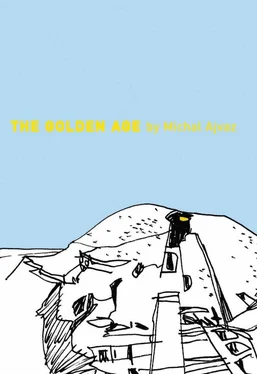Michal Ajvaz - The Golden Age
Здесь есть возможность читать онлайн «Michal Ajvaz - The Golden Age» весь текст электронной книги совершенно бесплатно (целиком полную версию без сокращений). В некоторых случаях можно слушать аудио, скачать через торрент в формате fb2 и присутствует краткое содержание. Год выпуска: 2010, Издательство: Dalkey Archive Press, Жанр: Современная проза, на английском языке. Описание произведения, (предисловие) а так же отзывы посетителей доступны на портале библиотеки ЛибКат.
- Название:The Golden Age
- Автор:
- Издательство:Dalkey Archive Press
- Жанр:
- Год:2010
- ISBN:нет данных
- Рейтинг книги:4 / 5. Голосов: 1
-
Избранное:Добавить в избранное
- Отзывы:
-
Ваша оценка:
- 80
- 1
- 2
- 3
- 4
- 5
The Golden Age: краткое содержание, описание и аннотация
Предлагаем к чтению аннотацию, описание, краткое содержание или предисловие (зависит от того, что написал сам автор книги «The Golden Age»). Если вы не нашли необходимую информацию о книге — напишите в комментариях, мы постараемся отыскать её.
is Michal Ajvaz’s greatest and most ambitious work.
The Golden Age
The Golden Age — читать онлайн бесплатно полную книгу (весь текст) целиком
Ниже представлен текст книги, разбитый по страницам. Система сохранения места последней прочитанной страницы, позволяет с удобством читать онлайн бесплатно книгу «The Golden Age», без необходимости каждый раз заново искать на чём Вы остановились. Поставьте закладку, и сможете в любой момент перейти на страницу, на которой закончили чтение.
Интервал:
Закладка:
Now that the mystery of the silver ball had been settled, I asked the girl what this video recording was supposed to mean. She explained that she and her friends were shooting a film which was an adaptation of The Iliad . All the action took place inside buildings in Michle. The rooms of the apartment represented the tents of the Greeks and the chambers of Priam’s palace, while the battles were fought on crepuscular staircases and in dim-lit corridors and the assemblies of war of the Achaeans were held in entrance halls and courtyards. When I told the girl I had thought at first that the film was for advertising purposes, she was obviously delighted. The film was inspired by advertisements for ladies’ cosmetics, the pictures of Giorgio de Chirico and Plotinus’s Enneads , she said.
It appeared that the Michle Iliad was mostly the work of the girl. She explained to me that the first impulse to make the film was a dream she’d had, in which Achilles and Hector were fighting with heavy swords in front of a bookcase of dark polished wood in the living room, the Persian carpet muffling their footfalls. The glass doors of the bookcase reflected the neo-renaissance facade of the building opposite with its dusty mascaron . When she awoke, the calm light of early morning lay across the things in the room, and she had the impression that the characters of her dream and the calm light began a dialogue, in the course of which their voices merged into one. And the vision of her Iliad —filmed, if possible, from the first line to the last — was born; from Agamemnon’s return of Chryseis to the agony of Hector and beyond, in the style of a television advertisement, in expansive, well-lit rooms where the emptiness of simple modern luxury was masked neither by object nor ornamentation; this emptiness pervaded Chirico’s spaces, inhabited by ghosts of the past and the future, and Plotinus’s spaces, formed from light which was not yet darkened by shape nor materialized as object. She envisioned all these light-filled voids merging into one, the three lights becoming a single white glare-free glow.
And in this glow the girl wanted to see Achilles and Hector, Agamemnon and Odysseus — characters for whom a world controlled by the whims of the gods was the source of acute anguish and even greater joy. This was the joy of the great Game, part of which was an acceptance of whatever each throw of the dice would bring, when one never knew whether it would fall on its black or its white side. An unhappy throw of the dice — a revelation of divine animosity — meant anguish for sure, but this anguish was part of a joy greater still, the joy of the Game. The girl believed this world called for the calm light she had known first in her dream, then on the walls and floor of her room; she longed for the bodies and objects of the world of the great Game.
The voice behind the wall
The girl was a student and her Iliad vision had come to her at the beginning of the summer vacation. So she was able to sit at home day after day, looking through the window at the Pankrác hillside or watching the play of the light on the furniture, all the time imagining one scene or another from her film. She said nothing to anyone else about her ideas because she thought people would laugh at her about them; indeed, the film seemed pretty ridiculous and nonsensical to her, but she couldn’t stop thinking about it. On top of everything else she had no experience of making a film and didn’t know anyone who had.
Curiously enough it was her dream-soaked lounging in the Michle apartment that produced the encounter that gave her the courage to start making her Homeric film of light. So rich was this encounter that it inspired her to find people with the right experience and level of enthusiasm to work with her. The apartment was quiet at all times of the day and night. The sounds of the relatively busy Michle streets did not reach it: all its windows faced the Botic brook. This was one of those city spaces with a brook or a railway line at its heart that might have belonged to another world…
“It was so quiet that I could hear hushed voices from behind the walls, above the ceiling and under the floorboards, the practically inaudible music of the neighbouring apartments,” the girl told me. When she fell silent for a moment, I, too, heard the quiet voices like fine sand falling on the bottom of a time-glass. The girl went on to explain how she would hear — from early morning till late afternoon — a monotonous male voice from beyond the living-room wall. The voice took a great many short pauses. She imagined that it was dictating some kind of long text, and sometimes she had the impression she was hearing the quiet clack of a computer keyboard. She was curious about this endless dictation. If she pressed her ear against the wall, she could hear a little better, but to begin with she could still make out no more of the voice than its melody. But after she had concentrated hard for a while, she began to distinguish words, although all she really heard were fragments and hints from which she figured out whole words. Then she experimented with these probable words in likely sentences, which she completed with words she had heard nothing of. With great effort the girl’s sentences came together to form fragments of a plot. It was a long time before the girl was competent at this strained eavesdropping. But eventually a remarkable story began to emerge.
The girl was quite shocked by what she heard. Several times she saw the writer and his typist in the corridor — he a fair-haired young man in rollneck sweater, jacket and moccasins (and always carrying a black attaché case), she a well-groomed older woman in a suit. The girl marvelled that these two people — whose appearance suggested they had stepped out of a newspaper advertisement for a bank — could day after day roll around in the palpably sick images and utterances she heard through the wall. She had never even known that literature like theirs existed. She had read Maldoror and The 120 Days of Sodom , but her neighbour’s text seemed to her more fantastical, more brutal and more perverse. It was a novel about the life of Amélie, a prodigal daughter. In the beginning Amélie obeys her parents and wishes to be a good daughter, but the parents reproach her constantly for not loving them enough, sighing that she has fallen short of and offended their great love for her. One day they tell her they can no longer stand idly by as witnesses to her degeneracy — what pain it causes them! — so they intend to denounce her to the police.
This is a strange police force whose members are summoned from the pattern of the wallpaper, whither they return after they complete an assignment. The police and the parents take Amélie away from the town, to the place of a stinking cesspit connected to a nearby factory by a pipe from whose mouth there issues a violet dribble. There they force the wretched girl to undress before tying her to a post next to a cave where there sleeps a giant monster, whose chops protrude from the opening, showing teeth that in and of themselves are creatures of great cruelty. The teeth taunt Amélie, describing how they will sink themselves slowly through her flesh and into her guts, how they will greedily chew her up. From the damp, stinking depths beyond them, the tongue speaks up, shouting out in ecstasy its obscene vision of what it will be like to fondle the bloody flesh of the chewed-up girl; then it tries to force its way between the teeth in the hope of touching with its restless tip the flesh of Amélie’s body. The police officers have to leave because they are beginning to be transformed back into wallpaper, but the father and mother remain by the cave and converse with the teeth and the tongue about the great misfortune suffered by parents of naughty children. The teeth offer their commiserations while the tongue bursts into tears, so moving does it find their fate. Amélie is shaking with terror, pleading with her parents for mercy. The parents tell her it is too late now for tears, while the teeth declare that what is about to befall her should be the fate of all disobedient daughters.
Читать дальшеИнтервал:
Закладка:
Похожие книги на «The Golden Age»
Представляем Вашему вниманию похожие книги на «The Golden Age» списком для выбора. Мы отобрали схожую по названию и смыслу литературу в надежде предоставить читателям больше вариантов отыскать новые, интересные, ещё непрочитанные произведения.
Обсуждение, отзывы о книге «The Golden Age» и просто собственные мнения читателей. Оставьте ваши комментарии, напишите, что Вы думаете о произведении, его смысле или главных героях. Укажите что конкретно понравилось, а что нет, и почему Вы так считаете.












